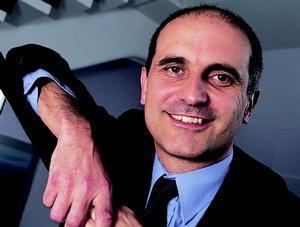director, Construction Best Practice Programme
Moone believes his inquisitive nature has been the main driving force throughout his career. He explains: "Right from when I started I was always asking questions. Why do things that way? Is this way not better? My drive for where I am now has been questioning the way things are done."
He realised early on, however, that this approach was not entirely welcome. "The only trouble with being inquisitive is that bosses don't like being told what to do," he says.
"I decided a better way of tackling the problem was to become one of them; that way I could have an influence. So I became a site manager, surveyor, and then a project manager. I even joined the Chartered Institute of Building, so I could have more of an influence over legislation," he adds.
Having such a varied career in construction has afforded Moone a priceless insight into the industry. "Looking back there are so many things that have influenced me," he recalls. "I've been a surveyor at a private practice, which taught me a lot about the commercial aspects. I'm also a chartered surveyor and a chartered builder, which has helped me to be a good technician."
An early experience of best practice methods had a fundamental effect on Moone's approach to his work. In 1994 he was brought in to manage a local authority property portfolio, where he learned of an innovative method of construction. "I spent a period working for Berkshire Council. I met someone there who had developed some best practice methods, although I didn't realise it at the time," he remembers. "He had developed a process to keep his clients well informed. He was also into preassembly. Working with him I found we were delivering a complete product rather than a service – a full package deliverable in a short period of time, with no defects. It revolutionised my thinking, and made me ask why do we have all this hassle with building practice?"
Moone joined the CBPP in the summer of 2000. "This role was a natural step for me. I had already worked with Zara Lamont, the previous director, delivering the Lean Construction initiative. Zara was looking for someone to take on a role called company engagement. It involved visiting companies who contacted the Programme for help and troubleshooting and I thought it sounded ideal. I spent a year doing that," he says.
In October 2001 Moone took over as director of CBPP. "It was always my aim to become director when I joined," he explains. This drive to get to the top is something Moone encourages in all his employees. "I think if you empower your staff you can really get them working for you – they take the responsibility for themselves. I want my staff to challenge me for my job; it keeps me on my toes. It means they are striving not just to be where they are but to better themselves."
He believes engineers have an essential part to play in delivering best practice: "Engineers involvement is essential in improving buying methods and communication once a job has been won. If things go wrong in a supply chain people tend to blame those above. It's all about communication. I think all too often clients don't procure in the right way, so construction professionals need to get together and show clients what needs to be done."
With government funding confirmed for another year Moone is optimistic about the future of the CBPP. "We currently have around 4% of companies committed to best practice. It doesn't sound much, but most are the majors and the value of their work is around 60%. There's still plenty to do, but we're determined to succeed," he says.
Source
Building Sustainable Design





















No comments yet